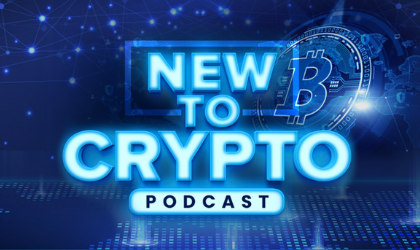SUMMARY KEYWORDS
blockchain, crypto, simba, chain, simba chain, listeners, build, web, blocks, supply chain, platform, applications, companies, data, projects,web 3.0
SPEAKERS
Bryan Ritchie, Crypto Travels Michael
Michael 00:01
Welcome to the New To Crypto Podcast designed to guide you through the crypto landscape with pinpoint accuracy created for the new and intermediate crypto investor. Join your host crypto travels, Michael, as he takes you through the different facets of getting started and succeeding in your crypto journey. New to crypto podcast brings you new episodes daily Monday through Friday with surprise bonus episodes sometimes on the weekend. Let me ask you, Are you new to crypto and don’t know where to start? Are you more experienced but have questions? Then you’re in the right place. This podcast is designed for you coming at you from the trading center in the lifestyle design studio. Here’s your host Crypto Travels Michael. Brave Wallet is the first secure crypto wallet built natively in a web three crypto browser, with no extension required. You can store manage and grow your portfolio, and get NFT’s and multi-chain support. Download the brave privacy browser@brave.com slash new to crypto and click on the wallet icon to get started. Hey, welcome to today’s podcast. I’m excited about today’s interview. Today I have Brian Ritchie who is the CEO of Simba chain, the development platform that helps companies transition from web two to web three. He’s also a partner at a partners, a leading venture studio and investment firm, and previous December. Brian was Notre Dame’s vice president of innovation, leaving the university’s innovation derisking an enterprise acceleration Center, where he worked closely with Dean’s alumni, faculty, and students to start over 150 companies as general partner and Chief Investment Officer for the pit road fund. He led investments into over 42 companies. Brian has an extensive experience in both industry and academics in the academy. He has been a full professor at Michigan State University, the University of Utah, and the University of Notre Dame, I’d like you to welcome me in welcoming Brian Ritchie to the podcast. Brian, man, it’s a pleasure to have you on the show. Thank you
Bryan Richie 02:18
What a great intro. Thanks for having me. I’m really excited to be here.
Michael 02:21
Right? Hey, absolutely. Before we dive in, can you share with our listeners just a little bit about yourself?
Bryan Richie 02:27
Sure. Yeah, sure. I started in the tech industry in the 90s, when I know most of your listeners probably weren’t even born yet. And I’ve seen you know these transformations as we’ve gone from web one to web two and, and now to web three, I worked for some early networking companies started my own company several times, exited those and, and then decided to get back into teaching where I took me to be a professor, as you mentioned, but my real love is starting companies I’ve now done about 450 companies from zero to one got about 16 exits, three IPOs that I’ve been a part of, and then now been working with several of these investment funds and venture studios. So just have a deep love for starting companies and am now really excited about this web three transformations that we’re currently in and working with Simba.
Michael 03:12
Wow. Now, thanks for sharing a little bit. Did you say hundreds? Yeah, hundreds of projects you’ve been involved in? You know this is a serial entrepreneur to the core. All right. We’re speaking the same language right here. Hey, before we jump into some more detailed technical overview type of things about Simba chain, can you just share like little general idea and like an overview for our listeners as to what Simba chain is?
Bryan Richie 03:38
Yeah, sure. And, and it might be fun to just tell really quickly our founding story. So our two co-founders answered a DARPA request for a grant around secure information on the blockchain. And one of our co-founders is a 30-year peer-to-peer networking veteran who was also at the University of Notre Dame and we answered that grant and got the grant and went and built out this secure internet messaging platform. In fact, Simba initially stood for secure internet messaging on the blockchain architecture such as the idea of where Simba Chain but in the process of building out that application, just realized that it’s super hard to build out on blockchain it. I mean, you require so much specific knowledge based on which chain you build for you know, you got to know solidity you got to understand the hashing and all that stuff that is super technical. And what we realized was we should be building the abstracted platform that just makes that easy. So that’s what blockchain I mean, that’s what Simba is, and we change the name to just be simple blockchain applications. So that’s what’s in the stands for now. And that’s our whole focus our whole purpose.
Michael 04:46
Wow. Okay. Well, I have quite a few questions to dig into about that. Before we do we have listeners in 168 countries and growing on the show, and can you just share a little bit about what like what is DARPA for listeners that may not be familiar? Yeah. So
Bryan Richie 05:02
you know, DARPA is just a, it’s an organization in the US and in the DOD, that usually does interesting things around the information supply chain. And by the way, this is where we really got started in kind of real-world business solutions. So so for us, you know, they were in this case, the government has been a first mover in blockchain because they recognize the opportunity to solve real-world problems with this. And they were, you know, it’s just a research organization and was looking to solve a real problem. And we were able to do that for them.
Michael 05:33
Wow, congratulations to you guys for, you know, being problem solvers. So let me ask you, who would be the best-targeted customer or business that Simba helps?
Bryan Richie 05:46
Yeah, that’s a great question. So for us, we’ve really been given our background that I just told you about, we’ve really started with the enterprise and large organization. And we started at the top Dazzle, we’re usually working with the CTO’s of those organizations who are, who are really trying to solve specific problems. I’ll give you an example. We worked with Boeing. In fact, for all of your Mexican visitors, our listeners, we’ve also worked with Toks, which many of them are familiar with, but they’ve come with very specific problems, they need to either give visibility into their supply chain, or they want to ensure sustainability, or they want to help with, you know, tracking assets through various points that in the past have been difficult to verify or validate. So these are all areas that we’ve really started with. And, you know, while we know that there will be a lot of other applications that people might develop on our platform, you know, asset management, tracking, supply chain tracking, food safety and supply, those are big areas that are obvious for us, and it’s kind of where we’re starting.
Michael 06:48
Okay. And I mean, I’ve also done my research and preparing for this, I’ve seen that you guys are helping, you know, businesses, enterprises, and supply chain food beverages. You mentioned aviation, you mentioned Boeing, automotive, manufacturing, medical, and, of course, government. Right? That’s right. Let me ask you, how does Simba eliminate the complexity of blockchain app development, making web three, technology accessible to all? Because I love what you guys are doing of how you’re helping bridge the gap.
Bryan Richie 07:21
Yeah, yeah, no, I appreciate that question. So really, if you think about most of the people developing today, they’re developing in a web two, very centralized, you know, if you think about a cloud environment, and what we’ve done is we’ve created a platform that looks and feels very web two, it’s a REST API development platform, it is abstracted away from the actual blockchain, the need to know the specific blockchain information because we’ve all made it an API. So now what you can do is you can make calls just like you would in any REST API development environment that can access any blockchain. So think about this for a second Mike, right now, if you develop for blockchain, you got to pick your chain, you got the specifics of that chain, you got to develop for that chain. And then once you’ve chosen that you’re locked in, in our environment, because we’ve abstracted that upper level you can develop today for let’s say, you choose polygon. And tomorrow, you want to do it on avalanche, it’s just a simple API call change, and you can move into a different chain, we have searched across all of the previous changes you’ve done so you don’t lose anything. And just make it really simple and cost-effective to build that out. And in a low code environment.
Michael 08:33
Wow, that actually overcomes major Pitfalls, I guess you would say, for new crypto startup projects. I’ve been in many meetings with the crypto community, and physical in-person meetings and I’ve talked with a lot of people who either want to start up projects or they already have one, and you just hit the nail on the head. You know, they’re, they’re sort of back in, in the beginning to just one particular blockchain.
Bryan Richie 08:56
Yeah. And you know, the cool part about this is, on the far end of simplicity, we’ve got it’s so easy, right? I mean, we have a graphical user interface, drag, and drop, it writes solidity code in the background is a super easy way to get started. But for the more sophisticated developer, we have all the tools that you would want, right? The SDK, the API’s, all the dev toolkits, everything that you need to really build out very sophisticated applications. I mean, we’re doing we were doing a project right now with Boeing spirit and Raytheon on the C 46 transport plane that is as sophisticated as you can possibly imagine, with respect to supply chain, so whether you’re doing you know, finance or supply chain or food safety or health care, as you mentioned, you know, you can access and build any of those applications on our platform.
Michael 09:43
Okay, good to know. So what would be the process for someone who’s interested in building web three applications with you guys? Or is it is there anything in addition to what you just mentioned, about the interface and how you filter it out or like for let’s say, we have listener we have probably Next, the future projects if you will, and they want to reach out to you and your team, what’s the process look like?
Bryan Richie 10:05
Yeah, for sure. So we have a number of different entry points to make this, again, super simple to work with us. I mean, obviously a super easy way just to go to Simba chain.com. And, and just connect with us there. And you can start to see all of our use cases out there. But you can also connect with us and get started, we have a couple of different models. One model is if you already know what you want to build, and you’re going to start at block a web three application from the ground up, we’re happy to work with you to get you started on that process. And again, the product itself is so simple to get started. But most of our customers already have web two applications. And they want to start to integrate web three functionality into those web two applications. And the good news is, is that this isn’t an all-or-nothing scenario, it’s not like you have to dump your web to application and start over on a web three application, we make it super simple to actually integrate the new functionality in web three that you want to integrate within your web two application. And there again, you can either work with your development team, or we have partner development teams that can work with you. And we can also help with our support and go-to-market teams that can help you get started. So lots of ways that you can do this, and if you don’t and you can start really small. So a lot of these companies started with small projects and built out over time.
Michael 11:25
Okay. Let me ask you, why is it important for a company to say the transition from say, web two, and get into building web three applications? What are some benefits for some of our listeners around the world that may or may not be so detailed in this area,
Bryan Richie 11:42
I think there are three or four really big important reasons. And I’ll just these aren’t in any particular order. But let me just talk about a few of them. One is that the data itself, the data that you put on the chain has never been hacked, we talk about blockchains being hacked. But really that’s not true. What’s happening is that they’re getting access to keys in a way and they’re getting access to the data, but the data have never been hacked. So there’s a security level that goes beyond a centralized location, which we call kind of a honeypot of hacker locations, right where people can hack easily a lot of data. That’s not true on the blockchain. So there’s a real advantage from a security standpoint to doing work on the blockchain. The other thing is, if you’ve got a lot of people or a lot of organizations that need to read and write and transact with the data simultaneously, the blockchain is a great place to do that because it can do it in a trustless environment where you don’t have people who have to verify or validate those data. This leads actually to huge benefits economically. So one of the cases we’ve done that some of your listeners might be familiar with is that we helped the talks restaurant chain track their coffee from the farmers in Chiapas, all the way to the cup of coffee in the restaurant, and the app is coming soon, because of our knowledge of where this from the supply chain that a customer can actually walk into a restaurant, click on a QR code and tip the farmer. That’s how much knowledge we now have around who grew it, where it was grown, and what the quality was. But the really cool part is that now we’ve been able to 6x the revenue back to the farmer, they weren’t, they used to be making 15k a year, and now they’re making 75k a year. Now their kids are able to come back and join them back on the farm again. And just from assist, just from a sustainability standpoint, this has really changed the business for them dramatically. We removed nine layers of verification in this process by using the blockchain.
Michael 13:31
Wow, man, that’s major. So you basically been helping the entire coffee industry or have begun your footprint into Mexico and in working with the farmer all the way up to the large corporation who has the restaurants, where ultimately the cup of coffee is consumed?
Bryan Richie 13:50
Correct. And the cool part too is that now these farmers because they have such access to verifying their quality have now been able to export. So now this is connecting to the big export houses in Switzerland that are taking Mexican coffee that never did before because now they have validated and verified provenance in the supply in the supply chain because it’s all in the blockchain as they go forward. So again, there are huge advantages of this to everybody engaged in terms of the way that they can now do business that they couldn’t before.
Michael 14:19
Wow, man, that’s fantastic. Can you talk about you have also had a case study about aviation with I think it was the air force that you guys worked with? Yeah. So
Bryan Richie 14:30
NAVAIR came to us and said, you know, we’ve been working with a number of suppliers or we have some main suppliers like Boeing, but we also have 400 sub-suppliers, some of which work through Boeing, some of which work through us. And right now, we can’t tell at any one time where the parts are in the supply chain. We have some ideas that they are between x and y, but we couldn’t give you the exact location, how long they’ve been there and what the projection is for how long they will be there. What we were able to do was Put all of that in a blockchain that allowed multiple parties to write the data, and then consume the data through a number of other applications that they wanted to use that allowed them to see the data in real-time. So now they can look at any part of the plane that they’re building. And they can find out exactly where it is, how long it’s been there, how long it will still be there, and when it will be someplace else, as well as defect and quality information, which has really changed the game from a supply chain standpoint. So for any supply chain doesn’t matter whether it’s textiles, manufacturing goods, or food, you’re able to now track it back to the source where it is at any given point in time what the interactions are with at that given point in time, which I think gives companies a lot more power and opportunity with, with what they’re building and shipping.
Michael 15:46
Brave wallet is the first secure crypto wallet built natively in a web three crypto browser. What’s web three, web three is freedom from big tech in Wall Street, more control, and better privacy. But there’s a weak point in web three, your crypto wallet. Most wallets are browser extensions or web two technology. That means the same old risks, app spoofing, phishing, scams, and theft. Brave wallet is different. Brave wallet is the first secure wallet built natively in a web three crypto browser, no extension required. With brave wallet, you can buy store, send and swap assets, manage NFT’s even connect to other wallets and dapps. All from the security of the best privacy browser on the market. Whether you’re new to crypto, or a seasoned pro, it’s time to ditch those risky extensions, it’s time to switch to brave wallet, download brave@brave.com forward slash new to crypto and click on the wallet icon to get started. Wow, man, I just love how you’re helping bring different industries into web three. And in the blockchain, traditional business models that may have not had a background in it, they see as the future they see all the benefits that you’re talking about the transparency, that trustless they can locate certain things, but to bring it all together. And what you guys have created is a phenomenal part. Let me segue into Can you explain what symbol blocks are? Yeah, absolutely. Because I saw one of your case studies, you know, you mentioned it. So if you can kind of paint us a picture. Yeah, absolutely.
Bryan Richie 17:26
So because we’ve built a platform product on which you can build anything, we started to realize that there are certain implementations that are both really useful and can solve problems and are in demand by our customers. And what we do is we build out pre-built what we call blocks. These are additional API’s, but also code to help solve those specific problems. So for example, we’re building a supply chain track and trace block. And what that means is we’ve done so many of these blockchain supply chain implementations that now what we’ve done is packaged all of that up as a quote block that runs on our platform that a customer can just take an implement, write it, think about it like a template, so they could sit down and have a complete implementation of a blockchain solution, which they could then take and customize, or you know, finish making exactly what they want. That’s already pre-built. And we see a number of these right, like NFT, asset management and a team marketplace development, supply chain track and trace information management, metadata, registry management, all of these would be blocks that would run on top of our platform. Ultimately, we hope that the development community will build their own blocks that run on our platform, which they will make available as well. So I think there’s a lot of upside here, as we build out these solutions. As you know, there are 10s of 1000s of solutions and opportunities to build out on blockchain, we think all of those will be able to run on blocks. So again, whether it’s defy or whatever, you know, we’re gonna build out those blocks.
Michael 18:56
Fantastic. It seems like those blocks have helped overcome some common challenges with like, even the user-friendly UI and low code dev environment that you have built-in with you basically, as you said, You created almost like a template, a working canvas, if you will, that’s one of my favorite expressions like working canvas of how to a place to begin for these companies that are coming to you.
Bryan Richie 19:20
Totally right. And that’s, and the nice thing about that is just again, more ease of use, right? The platform’s already easy to start, but now we’re basically bundling open source code that people can start to use as templates to build out their applications.
Michael 19:34
Fantastic. And you mentioned NFT’s and we all know the NFT’s have exploded in the last few years. And can you share with our listeners and explain the advantage of your NF T block which is one of Simba’s products, and you know, for companies and explain to also the companies that may hear this about maybe they want to integrate NFT’s into their business model?
Bryan Richie 19:55
Yeah, this is a really important point you’re bringing it up here because you know in the past most people have thought about NF T’s as digital art you know they think of board apes Yacht Club kind of stuff and, and that’s fine. But that’s not the real upside value of NFT’s. They are a representation of an asset that can be either digital or physical. And it’s it allows you to be able to track that asset through its lifespan. So, you know, I’ll give you a great example. We’re using NFT’s to track automobiles for the California DMV, where each vehicle get has a lifespan, right, it has a first owner, and it moves through multiple owners, and you want to be able to tie that vehicle to the owner at any given point in time. This is useful for fraud purposes, insurance purposes, and taxation purposes. And because you’re able to do that, that asset then becomes trackable. And it also becomes verifiable and validated, which might be useful for collector’s items, you can think of anything that you wanted to verify, like, hey, this Rolex watch is a real Rolex watch and was purchased at this point in time. And it has this validation signature in it, we’ve done this for snowboards, we’ve done this for cars, you can do it for art, certainly, that’s where it started, but fine art. Yeah, the Chinese are now using NFT’s to track intercompany transactions. So you know, we’re working with big manufacturers who are selling internally, equipment, finished product inventories, all of those things can now be tracked using NFT’s. And what we’ve done that makes it even better than a lot of other people is we put extra security and privacy capabilities into our NFT blocks. So we track in the chain the metadata, which gives a cryptographic hash thumbprint of the asset inside the chain, so you can never lose it. One of the things some people are recognizing is that they buy an NFT, they come back six months later, and the URI for pointed to the asset is no longer there that you’ve got linked to K. And so it no longer points to the asset for which it was purchased. We solve that problem by putting all of that in the chain. And then because we’ve worked with polygon and avalanche that the cost of doing that is fractions of a penny. So it’s really cool technology.
Michael 22:08
Wow, man, that’s exciting. We touched on something earlier, and I just want to circle back to it. And when businesses or even governments turn to blockchain and turn to Simba, how do you guys help them identify which blockchain would be right for their project or for their use cases? Because you guys help consult in that area when they come to you?
Bryan Richie 22:31
Or? No, absolutely, we, and one of the things that is a driving foundational principle for us, as I mentioned, is that we’re blockchain agnostic. But what we have done has been able to point people and say, Look, do you need a public chain or a private chain? And because we support both, we can then say, is this something you’re just doing with you and your suppliers, you might want a private chain, or if you want other people on it that you don’t necessarily know today, you want a public chain, what’s more, important to you is is accessibility more important is speed is cost. And then we can look at those things and say, These are the ones that we would recommend. And we have a couple of changes that we really like right now we really like polygon, we’ve done a lot of work on avalanche, we’ve certainly done you know, Aetherium main net, we’re doing a project on Tasos. We’ve even done Stellar if you can believe it, and you know, hyper ledger and a number of instances, we’ve done that as well. So the cool part too, is because we’re an API driven platform, if you came to us and said, Hey, I want to do this on you know, pick your chain, the graph, whatever, it would be a few days of work for us to get the API set up for you to be able to do that. So you know, it’s some of it is our customers leading us to change they want and some of it is us helping our customers pick the right chain.
Michael 23:40
Okay, thanks for yeah, thanks for sharing that. Brian, let me ask you, you touched on private and public chains, and for some of our listeners, because this is new to Crypto Show, right? Who might just be new to crypto, you know, and the listeners might be familiar with all blockchains are transparent and public, etc. However, when you help say, for example, the military or the government, you know, I’m going to venture to guess that those are probably private chains, you know, for our you know, your use cases. So, can you share with our listeners the difference of like what is a private chain? Yeah. So, the
Bryan Richie 24:17
the only difference between private and public chains is the private chain has a private consensus mechanism. So, the consensus mechanism is the means by which the members of the chain determine what blocks that are going on that chain are valid had been verified. So many of your listeners may have heard you know, bitcoin does a proof of work consensus mechanism where people have to you know, they have to mined for this algorithm in order to have the right to put the next block on. The problem with that is as many know it’s it’s not it’s very energy intensive. It’s not very green. It’s not very fast. Etherium on the other hand, which is also a proof of work right now is moving to proof of stake and other chains are proof Stake, which just simply means that those that have the coins at sufficient amounts and are willing to stake them, quote, stake them have the right to make the decisions about what goes on the block. So in a public environment, you’re relying on a consensus mechanism, you don’t control in a private chain, then the owners of the chain are determining what goes on and off the chain, and what’s valid and not valid. So you have more control over that. But it’s also you know, it’s also less secure, because in a in a public chain with lots and lots of people to validate. That’s why it’s almost impossible to hack because you can’t just make stuff up, it needs to be validated by a very large number of stakeholders on that chain. So there are pros and cons.
Michael 25:43
Thank you for defining that. Can you give us an example of how Simba is helping in say, for example, the medical industry?
Bryan Richie 25:49
Yeah, there are huge opportunities in the medical space. So I don’t know if your listeners and it may be different in Mexico than it is where I am in the US. But right now, my medical data is fragmented and all over the place, I’ll bet you, I’ll bet you 100 organizations have my medical data in some form or another, whether it’s X rays, or CAT Scans, CT scans, whether it’s the hospital notes, whatever the case, it’s all over. And I don’t control any of it, the orgs control it, what’s going to happen, I think here is blockchain is going to enable that those data to be owned by the patient. And in this case, the patient will be the one that has the data, and they’ll have control over who else gets it. And in this case, you’re going to be able to show up to your doctor with the data, have all of your scans have access to your you know, your X rays, or CT scans, whatever and be able to and take those with you to your doctor, you’re also going to be able to monetize those data. So blockchain is going to allow you to rent or sell your data for you know, whether it’s whether it’s research, clinical trials, any of that kind of thing. So I think it’s going to dramatically up end the way we do health care, at least in the United States, for sure.
Michael 26:55
Wow. That’s definitely a game changer. You know, I would, I would love to see, I would love to see that come to pass, you know, to change that entire part of that industry. Let me ask you, what else? What is coming for Simba? What is your roadmap for the rest of 2022? And beyond into 23? And four
Bryan Richie 27:17
look like? Yeah, well, we have a lot on the roadmap, certainly, we have a lot of features and a lot of blocks that we’re building out for the block plat blocks platform. So we have a lot of the the other functionality and the templates that we talked about that are on our roadmap. But probably the biggest thing on our roadmap is our desire to move from being just a web two company to being a web three company ourselves. And what I mean by that is, we’re going to be open sourcing key components of our code, and decentralizing those aspects in the management, we see ourselves getting to also a token that will be part of the tokenomics of our ecosystem. And the way that we use our product, which would encourage developers to build for our product, you guys, I talked about each of those blocks. And then people also use and implement those blocks for their projects. So we see this moving to be a pure web three company over time. And that’s very much on our roadmap over the next 12 to 18 months, in terms of getting that process really moving.
Michael 28:17
Fantastic. Awesome. Is there anything else you would like to share with our listeners? And what’s the best way? This episode, of course, is on our website, Episode, and Blog Post page with all your links, but what is the best way that our listeners can reach out and stay in the conversation with you and your team? Oh, yeah,
Bryan Richie 28:33
we would love that. Encourage that completely. So you can reach me just at BK at Simba chain.com. Obviously, you can go to our website and really connect with us at any time and connect with our dev people, our technical talent, and our product people, we’d love to continue that conversation there as well. The one thing I would leave your listeners with at this point is just a realization that we are right in the middle of a transformation that is exactly similar to what we did with the internet in general, I don’t know how many of your listeners have been around for a while. But for me, what we’re going through right now reminds me exactly of what we went through in the year 2000 2001, the early 2000s. With the internet, huge hype, followed by a reality check, followed by tremendous upside potential and opportunity with that transformation. Blockchain is going to solve a lot of problems. It really is the recognition of the peer-to-peer promise with a completely trustless environment, which is gonna allow us to do transactions peer to peer, it’s going to disintermediate all kinds of these intermediate validators. So you think about in finance and supply chain, all these things we talked about, it’s all these intermediaries that are going to be disintermediated. So it’s going to be really interesting to watch and I’m fascinated to see how this plays out.
Michael 29:49
Well said well said Bryan. Hey, it was a pleasure to have you on today’s show and you’re welcome back anytime.
Bryan Richie 29:55
I appreciate it. Michael, very good to talk with you as well, and love to continue this conversation. Thank you So much. Absolutely, absolutely.
Michael 30:02
If you’d like today’s episode, and definitely like it, subscribe to the podcast. If you’re watching us on YouTube, click that little bell notification and subscribe to the channel. Show your support and chime in here tomorrow for another special episode. Until then, make it a great day. Thanks for tuning in to new to crypto podcast. If you liked the episode, be sure to follow and subscribe. You can listen to every episode on all major platforms and have an interest in being on the show or one advertising reach out at new to crypto.io. Head over to our site new to crypto.io to access the resources mentioned in each episode. Until next time, remember to navigate the crypto landscape with pinpoint accuracy
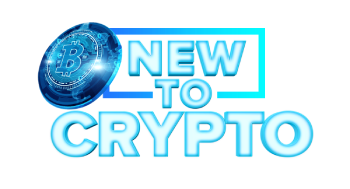
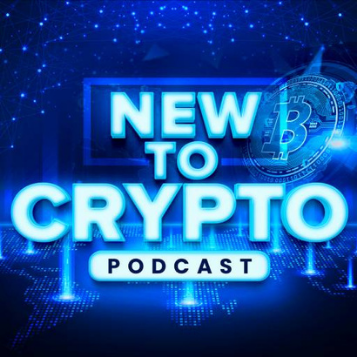







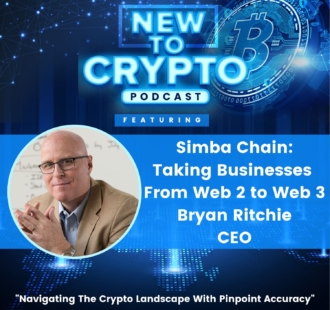

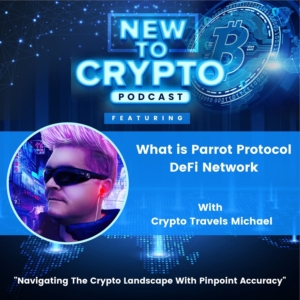
![SolDate: First Ever Dating App on Blockchain [Solana Series]](https://newtocrypto.io/wp-content/uploads/2021/12/SolDate-First-Ever-Dating-App-on-Blockchain-Solana-Series-300x300.jpg)

